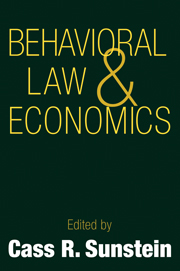Book contents
- Frontmatter
- Contents
- Contributors
- Acknowledgments
- Introduction
- Part I Overview and Prospects
- Part II Heuristics and Biases: Shortcuts, Errors, and Legal Decisions
- 2 Context-Dependence in Legal Decision Making
- 3 A Positive Psychological Theory of Judging in Hindsight
- 4 Behavioral Economics, Contract Formation, and Contract Law
- 5 Organized Illusions: A Behavioral Theory of Why Corporations Mislead Stock Market Investors (and Cause Other Social Harms)
- 6 Reluctance to Vaccinate: Omission Bias and Ambiguity
- 7 Second-Order Decisions
- Part III Valuation: Values and Dollars in the Legal System
- Part IV The Demand for Law: Why Law Is As It Is
- Index
5 - Organized Illusions: A Behavioral Theory of Why Corporations Mislead Stock Market Investors (and Cause Other Social Harms)
Published online by Cambridge University Press: 05 June 2012
- Frontmatter
- Contents
- Contributors
- Acknowledgments
- Introduction
- Part I Overview and Prospects
- Part II Heuristics and Biases: Shortcuts, Errors, and Legal Decisions
- 2 Context-Dependence in Legal Decision Making
- 3 A Positive Psychological Theory of Judging in Hindsight
- 4 Behavioral Economics, Contract Formation, and Contract Law
- 5 Organized Illusions: A Behavioral Theory of Why Corporations Mislead Stock Market Investors (and Cause Other Social Harms)
- 6 Reluctance to Vaccinate: Omission Bias and Ambiguity
- 7 Second-Order Decisions
- Part III Valuation: Values and Dollars in the Legal System
- Part IV The Demand for Law: Why Law Is As It Is
- Index
Summary
Rationality is a strong assumption in the legal literature about how corporations and other organizations behave in market settings. The modern transaction-cost economics on which most contemporary corporate scholarship is based concedes that the rationality of officers, directors, and other managers is “bounded” (that is, that they do not have perfect information or unlimited time, skill, and attention) and acknowledges that these agents have self-interests that differ from those of their firms' owners. Because of these limits and the imperfection of contractual and other mechanisms for resolving them, firms will not always act in a way that maximizes shareholder wealth. But within such limitations, the world that is portrayed is still one of guileful rationality. Firms that depart too far or too often from this norm will lose needed capital and succumb to their more savvy competitors. Managers are presumed to understand this and act accordingly.
Borrowing from an explosion of work by social scientists on human judgment and decision making, legal scholars have been increasingly willing to rethink strong assumptions of rationality in the context of individual behavior, even within markets. They have not yet mined to any depth, however, any equally rich vein of research on organizational rationality. Yet here we find the skeptic's mother lode: empirical accounts – grounded in sociology and social psychology, but increasingly integrated with economic analysis – for why organizations so often behave in the myopic, rigid manner that we seem to observe in the real world.
- Type
- Chapter
- Information
- Behavioral Law and Economics , pp. 144 - 167Publisher: Cambridge University PressPrint publication year: 2000
- 2
- Cited by



